STORY HIGHLIGHTS
- NEW: Egypt's military chief meets with commanders hours before an ultimatum is due
- 16 people were killed in clashes at Cairo University, state media reports
- Journalists also hit by violence: one killed, one raped, others beaten
- Foreign minister resigns, Morsy's office says Egypt won't "go backwards"
Are you in Egypt? Send us your experiences, but please stay safe.
Cairo (CNN) -- Bloodshed intermingled with blood oaths early Wednesday in Egypt, as time appeared to be running out on Egyptian President Mohamed Morsy.Health officials have counted the bodies of 23 people, who died when Morsy's angry opponents met head on overnight with his supporters at Cairo University.
Hundreds more left the clashes with wounds, bruises, and other injuries, state-funded Al-Ahram news reported, after rocks, Molotov cocktails and bullets flew.
Demonstrations elsewhere in Egypt were mostly peaceful, and protest leaders have called for non-violence.
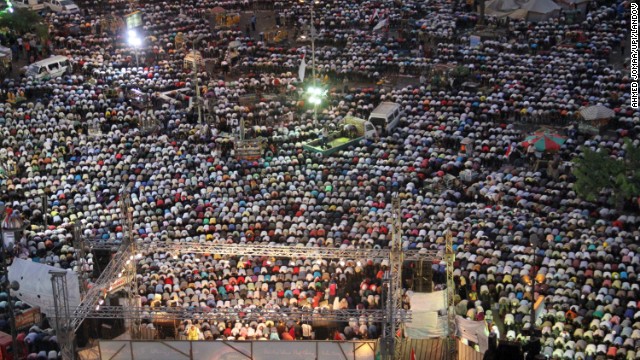 As throngs of Egyptians have been demonstrating for and against President Mohamed Morsy, photographers have sought vantage points far above the crowds, enabling them to show the enormity of the gatherings. Here, Egyptian men supporting Morsy pray during a rally near the Rabaa Adawiya mosque in Cairo on Monday, July 1. Click through the gallery for more aerials of the protests:
As throngs of Egyptians have been demonstrating for and against President Mohamed Morsy, photographers have sought vantage points far above the crowds, enabling them to show the enormity of the gatherings. Here, Egyptian men supporting Morsy pray during a rally near the Rabaa Adawiya mosque in Cairo on Monday, July 1. Click through the gallery for more aerials of the protests: Protesters at Tahrir Square in Cairo on July 1 demand that Morsy resign. The U.S. Embassy in Cairo, which has been closed since June 30, will remain closed on Wednesday.
Morsy opponents protest outside the presidential palace in Cairo on July 1.
Protesters carry large Egyptian flags while shouting slogans against Morsy and the Muslim Brotherhood outside the presidential place on July 1.
A sea of protesters opposing Morsy waves flags in Tahrir Square on Sunday, June 30. The Obama administration has urged Morsy to call early elections
Morsy opponents sit on a banner outside the presidential palace on June 30. State-funded Egyptian daily Al-Ahram has reported 46 sexual assaults during anti-Morsy protests in Egypt since June 30.
Participants in an anti-Morsy protest pray in Tahrir Square on June 30.
Anti-Morsy protesters pack Tahrir Square on June 30. Morsy, a U.S.-educated Islamist, was elected Egypt's president in June 2012. Critics say he's become increasingly authoritarian.
Morsy supporters gather next to the Rabaa El-Adaweya mosque during a demonstration on June 28.
Egyptian demonstrations from above
HIDE CAPTION
 Egyptian demonstrations from above
Egyptian demonstrations from above 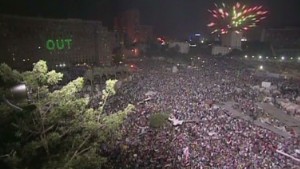 Morsy defies military's ultimatum
Morsy defies military's ultimatum  Photos, videos capture Egypt in crisis
Photos, videos capture Egypt in crisis 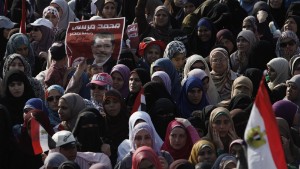 All eyes on Egyptian military's deadline
All eyes on Egyptian military's deadline But as a deadline approached on an ultimatum the military gave Morsy this week, its leaders spoke of potential bloodshed.
"We swear by God that we are ready to sacrifice our blood for Egypt and its people against any terrorist, extremist or ignorant," they said in a statement, which was titled "The Final Hours."
On Monday, the military gave Morsy 48 hours to accommodate his opponents with a power sharing agreement or be pushed aside. That leaves him until about 5 p.m. local time (11 a.m. ET) on Wednesday.
He has already said that he will not comply.
The head of the Egyptian army, Gen. Abdul Fattah Al-Sisi, called an emergency meeting with commanding officers hours ahead of the deadline, state TV reported.
Switching sides
With the ultimatum, the armed forces appear to have thrown their weight behind those voicing their vehement opposition to Morsy's Islamist government, and they have joined them on the streets.
Early Wednesday, soldiers and police set up a perimeter around their central meeting point, Cairo's Tahrir Square, "to secure it from any possible attack," the state-run EgyNews agency reported.
In a twist of irony, it was the police force that, on the same spot in 2011, killed hundreds when they fired upon democratic, moderate and Islamic demonstrators, who stood side by side to overthrow former autocratic President Hosni Mubarak.
Mubarak had long repressed the Muslim Brotherhood, an Islamic political movement, but it is now the nation's most powerful political force.
The democratic reformists and moderates say Morsy's government has tightened its grip on power, moving in an authoritarian direction. Now they have joined forces with Mubarak's followers and citizens yearning for the restoration of order through the military's iron hand.
Together they are pushing hard to oust Morsy and his Islamist government, which was mainly formed from the ranks of the Muslim Brotherhood.
They say they have collected 17 million signatures on a petition to remove him -- 4 million more than the number who voted Morsy into the presidency.
 Egyptian ministers resign amid unrest
Egyptian ministers resign amid unrest 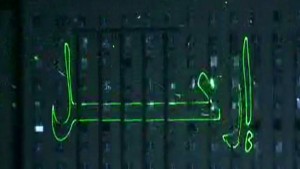 Egypt protesters' message to Morsy: Go
Egypt protesters' message to Morsy: Go 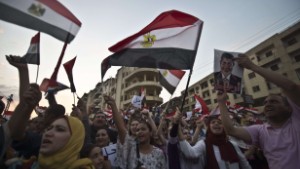 Protesters: We're not going; he must go
Protesters: We're not going; he must go 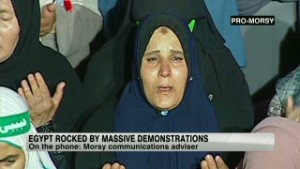 Morsy's close adviser speaks to Amanpour
Morsy's close adviser speaks to Amanpour The most zealous anti-Morsy demonstrators have ransacked Muslim Brotherhood offices all over the country in recent days, torching at least one.
Brotherhood members have complained that the police did not protect them. Some have taken matters into their own hands, in one instance firing upon vandals with shotguns, an international journalism association reported.
Coup or no?
Military leaders have told Arab media that they plan to suspend the constitution, dissolve the parliament and sideline Morsy, should he remain unbending.
In his place, they would install a mainly civilian interim council, until a new constitution can be drafted and a new president elected.
But military leaders have distanced themselves from the word "coup."
Their ultimatum was meant to push all factions toward a national consensus; the armed forces aren't looking to be part of the political or ruling circles, a spokesman, Col. Ahmed Ali, said Monday in a written statement.
The military appears to be pressuring Morsy to restructure his government to reduce the influence of the Muslim Brotherhood and include opposition members, a source close to highly placed members of Egypt's leadership told CNN.
Morsy's ministers would seem to have made a reshuffle easy on him, as five of them resigned this week, including Foreign Minister Mohamed Kamel Amr.
Potential for violence
Like the opposition, Morsy's supporters are numerous and adamant.
They believe in the legitimacy of their government and feel their opponents are circumventing the democratic process by trying to depose their elected government.
In a televised speech late Tuesday in reaction to the military's ultimatum, Morsy reiterated that position.
"The people of Egypt gave me the mandate as president. They chose me in a free election. The people created a constitution," he said. "I have no choice but to bear responsibility for the Egyptian constitution."
He demanded the military withdraw its ultimatum and return to its barracks.
The unrest prompted U.S. President Barack Obama to call Morsy Monday and urge a less rigid stance. "He stressed that democracy is about more than elections," a White House statement said.
He pushed him to form a more inclusive government.
On Tuesday Obama called on Morsy to hold early elections, a senior administration official said. But he has not said he should step down immediately.
"We are saying to him, 'Figure out a way to go for new elections,'" the official said. "That may be the only way that this confrontation can be resolved."
A State Department spokeswoman, however, denied that Obama urged early elections.
Washington has also warned Egypt's military that it could lose millions in aid, if it carries out a coup.
Though Muslim Brotherhood leaders have called members to refrain from bloodshed, others have warned them to be prepared to die.
And one Islamist group said it would take up arms, if Morsy is deposed.
Morsy's failings
Morsy, a U.S.-educated religious conservative, was elected Egypt's president in June 2012. But his approval ratings have plummeted, as Egyptian society and its economy have spiraled down.
His government has failed to keep order, as crime has soared, including open sexual assaults on women in Egypt's streets. The chaos in the wake of the uprising has driven many tourists and investors away.
That has disaffected many of his supporters among Egypt's poor and middle classes, said Fawaz Gerges, director of the Middle East Center at the London School of Economics.
"The millions of Egyptians who cheered for Morsy are saying he must go," Gerges said.
He called Morsy "incompetent" but said he doubted the military would depose him.
That would drive Egypt into an even deeper crisis.
Interactive map: Explore the locations of protests in Cairo, Egypt. Photos: AFP/Getty Images
CNN's Tom Watkins, Chelsea Carter, Schams Elwazer, Elise Labott, Ben Wedeman, Ian Lee, Housam Ahmed and Salma Abdelaziz contributed to this report.
We recommend
From around the web
You have read this article with the title EGYPT NEW CRISIS: Bloodshed and blood oaths stain Egypt's protests, as military ultimatum runs out. You can bookmark this page URL http://gaytunisia-to-da-ri.blogspot.com/2013/07/egypt-new-crisis-bloodshed-and-blood_3.html. Thanks!

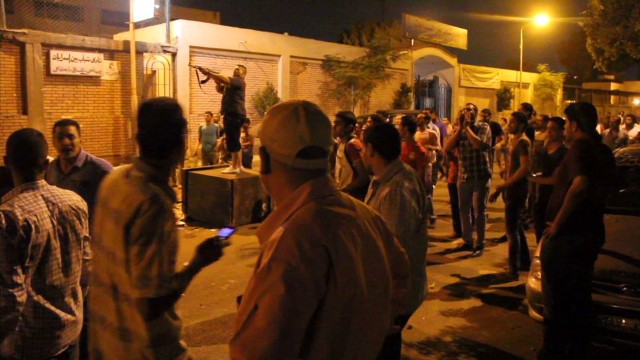
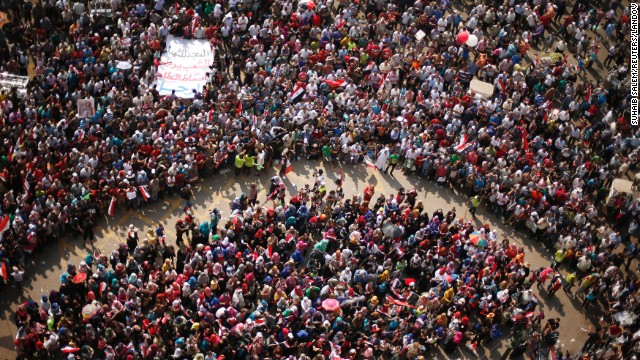 Protesters at Tahrir Square in Cairo on July 1 demand that Morsy resign. The U.S. Embassy in Cairo, which has been closed since June 30, will remain closed on Wednesday.
Protesters at Tahrir Square in Cairo on July 1 demand that Morsy resign. The U.S. Embassy in Cairo, which has been closed since June 30, will remain closed on Wednesday. 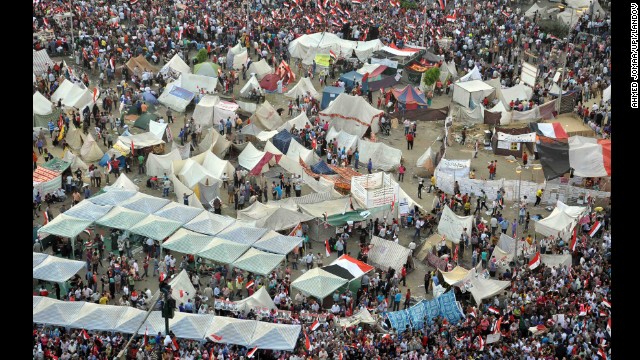 Morsy opponents protest outside the presidential palace in Cairo on July 1.
Morsy opponents protest outside the presidential palace in Cairo on July 1. 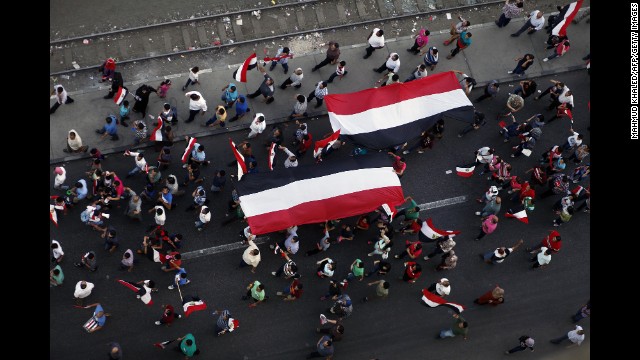 Protesters carry large Egyptian flags while shouting slogans against Morsy and the Muslim Brotherhood outside the presidential place on July 1.
Protesters carry large Egyptian flags while shouting slogans against Morsy and the Muslim Brotherhood outside the presidential place on July 1.  A sea of protesters opposing Morsy waves flags in Tahrir Square on Sunday, June 30. The Obama administration has urged Morsy to call early elections
A sea of protesters opposing Morsy waves flags in Tahrir Square on Sunday, June 30. The Obama administration has urged Morsy to call early elections 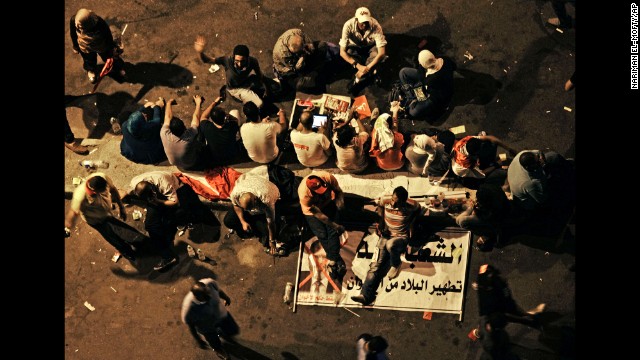 Morsy opponents sit on a banner outside the presidential palace on June 30. State-funded Egyptian daily Al-Ahram has reported 46 sexual assaults during anti-Morsy protests in Egypt since June 30.
Morsy opponents sit on a banner outside the presidential palace on June 30. State-funded Egyptian daily Al-Ahram has reported 46 sexual assaults during anti-Morsy protests in Egypt since June 30. 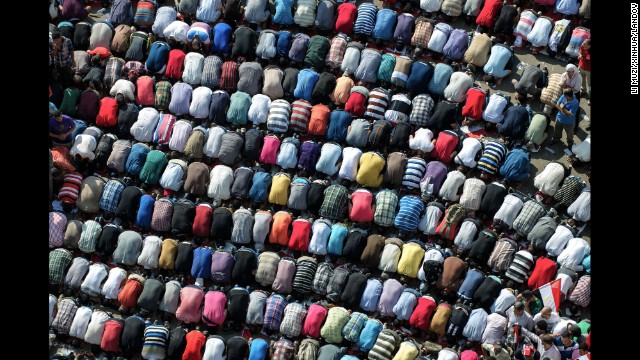 Participants in an anti-Morsy protest pray in Tahrir Square on June 30.
Participants in an anti-Morsy protest pray in Tahrir Square on June 30. 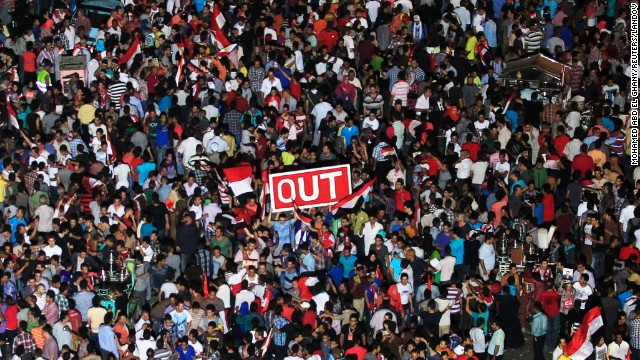 Anti-Morsy protesters pack Tahrir Square on June 30. Morsy, a U.S.-educated Islamist, was elected Egypt's president in June 2012. Critics say he's become increasingly authoritarian.
Anti-Morsy protesters pack Tahrir Square on June 30. Morsy, a U.S.-educated Islamist, was elected Egypt's president in June 2012. Critics say he's become increasingly authoritarian. 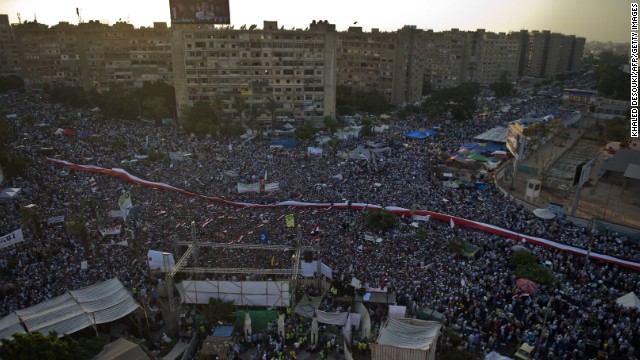 Morsy supporters gather next to the Rabaa El-Adaweya mosque during a demonstration on June 28.
Morsy supporters gather next to the Rabaa El-Adaweya mosque during a demonstration on June 28. 













